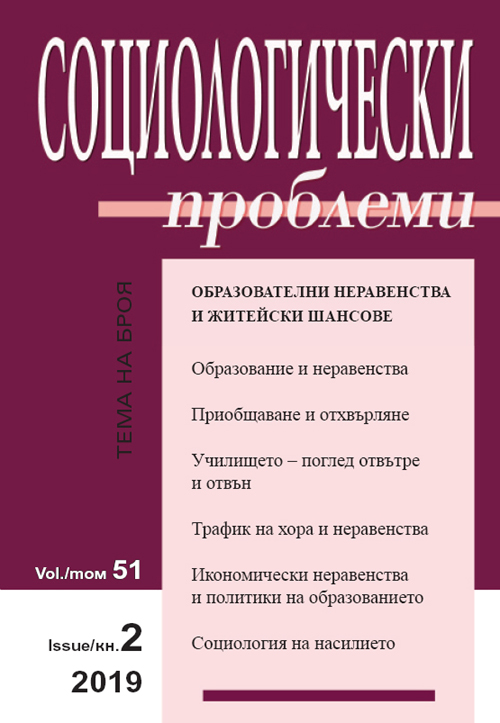
We kindly inform you that, as long as the subject affiliation of our 300.000+ articles is in progress, you might get unsufficient or no results on your third level or second level search. In this case, please broaden your search criteria.




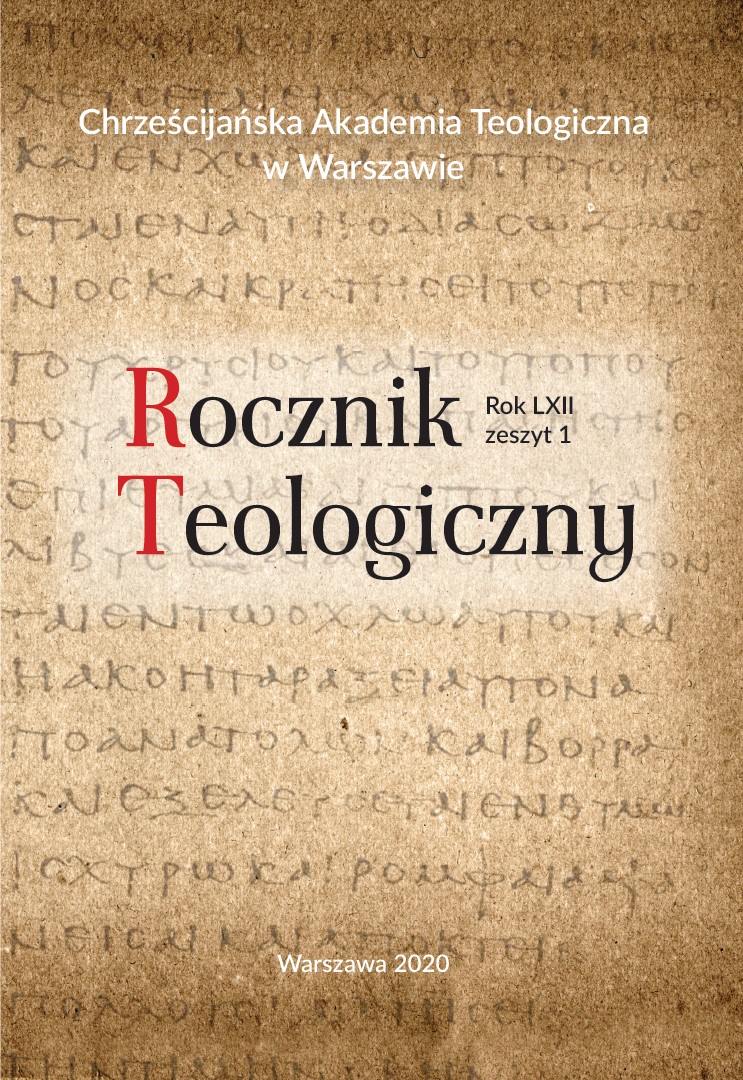
Although the concept of health covers several fields of science, usually it is analyzed in the axiological aspects, and it is described as the basic exis-tential and motivating values. Shaping health-oriented behaviour seems to be a fundamental element of ethics development, determining the respect of life. Meanwhile, a wide divergence between the declared high value of health and low health care is observed in studies, and it may be related to the different health perception. There is need for education to the value of health, since individuals, for which health is the most appreciated value and who recognize health appropriate (as a continuous process), may continue its efforts to feel responsible for the health and life and to recognize and promote respect for life value. The role of the education in that regard is inalienable since developed patterns will be passed on from one generation to another, which is particularly significant in the context of the contem-poraneity and the power of its threats.
More...
The aim of the research was to determine the importance of organizational ethical climate and the levels of corruption for determining the methods of solving the four ethical dilemmas typical of the working environment – “truth versus loyalty”, “individual vs. community”, “short-term versus long-term” and “justice vs. mercy” (Kidder, 1995). On an ad hoc sample of 313 employees from different organizations in the Republic of Serbia, an online questionnaire was applied for data collecting on the perception of the organizational ethical climate, the tendency towards corruptive rationalizations as factors in choosing alternatives in solving ethical dilemmas at work. The findings indicate the importance of the perception of the egoistic ethical climate and the climate of social responsibility for the willingness of employees to be merciful when solving the dilemma “justice vs. mercy.” It was found that the egoistic ethical climate probably generates the acceptance of corruptive rationalizations that predict the acceptance of “mercy” towards those who steal the company’s assets. On the other hand, the climate of social responsibility influences the preference of employees for mercy for those who break the rules, most likely because employees develop the belief that well-being is important for both the company’s clients and colleagues, even when they violate organizational rules. It was concluded that the perception of the organizational ethical climate indirectly influences the manner of solving ethical dilemmas at work. This is probably done by generating personal beliefs in employees, which then influences the preference for solving the ethical dilemma with which these beliefs are in accordance.
More...
In thе contribution, we will deal with an immanent textual analysis of the dynamics of the relationship between the Grand Inquisitor and Jesus in Karamazov Brothers. We will be primarily interested in the problem of the ironical dialectics that reverses the relationship between the originator of Christianity, the God Man, and His historical successor, the Church, so that the latter, strictly formally observerd, following the ultimate goal set by Jesus, ie. God Himself – reaches the very opposite side, obeying totally contrary principles. The matrix by which we will investigate this problem is the question of the author’s/establisher’s right for disposition of the sense, that is, the histo- rical continuance of his work, to which the Inquisitor refers in his ingenious defense of his initially crypto-apostate, and finally fully apostate position.
More...
This article deals with an analysis of the ethical aspects of using animals in experimental procedures - in the context of causing animals, pain or suffering. It covers the compilation and characterisation of the views of supporters and opponents of conducting experiments on animals. On the one hand, the findings of the above procedures may be important for the development of science (including medical and veterinary sciences), technology or industry, whilst on the other hand, they are often associated with pain or the suffering of living organisms, and have a negative impact on their health, or even life. This topic is the subject of scientific and ethical discussion, and attempts to find a compromise, that would allow the acquisition of reliable test results, and eliminate, or at least, reduce the negative consequences for animals used in them. The article refers to issues of altruistic and egoistic positions, species chauvinism, and the so-called 3R principles (replacing, reducing, refining). The article is primarily due to the entry into force of the Act of the 15th of January, 2015, on the protection of animals used for scientific or educational purposes, repealing the existing Act of the 21st of January, 2005, on animal experiments, and re-regulating issues related to the viability of using live animals in experimental procedures, exposing them to pain or suffering.
More...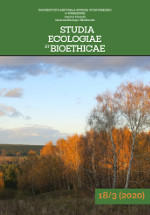

Human society of the modern world, which is greatly affected by technological and economic advancements, has to address moral problems with a new urgency. In many instances, the decision does not bring only positive effects. Such cases can be found in applied ethics: bio-medical ethics, business ethics, and legal ethics, but also in other areas of human activity, too, most recently, in debates, concerning the use of autonomous vehicles or autonomous machines in general. This paper aims to describe and explain the principle of ‘double effect’, when solving complicated and, from the perspective of morality, profoundly dilemmatic situations. The principle of double effect was gradually developed as a means of seeking the right moral decisions. It has a firm and respected position within Catholic medical ethics, but also in secular legislation. The paper presents current thought experiments, which clarify moral decision-making in dilemmatic situations. What seems to be a shortcoming here, is that ethical thought experiments are far too abstract. On the one hand, they refine our knowledge, but on the other hand, they are very partial. The evolution of medical imaging methods, has enabled us to take a closer look at the relationship between the deontological and utilitarian approaches to making moral judgments, but it does not relieve us of our responsibility for the decisions that we have made. The positive side of the principle of double effect, is that it protects us from the slippery slope of utilitarian consequentialism, where the admission of a lesser evil, is only a step away from committing evil in the name of the greater good.
More...
The aim of the article is to show the current state of research on the ethics of pharmacists and its contemporary approaches in the light of various bioethical systems. The great development of technical, biological, chemical, and biomedical sciences is the source of many ethical questions related to the transformation of human and world life. Particularly challenging are the changes that concern human life from conception to natural death and are associated with all medical professions, including the pharmaceutical profession. The pharmacist’s tasks go beyond ordinary commercial activities. The text of the article shows the status quaestionis regarding the ethics of pharmacists. Then, various ethical approaches are discussed and analysed: historical perspective, pharmaceutical deontology, and virtue ethics. In the light of the inadequacy of such models, a personalistic view of the pharmacist’s profession is shown, referring to personalistic bioethics. It provides an adequate and comprehensive opportunity to answer moral dilemmas related to the exercise of this profession. Among the various issues, attention is drawn to showing the pharmacist as a defender of human life, humanization of the profession, the issue of responsibility, and opposition to conscience. The analysis is carried out in the light of the principles of personalistic bioethics, concerning the most important documents of the Catholic Church. The personalistic approach seems to most fully address the complexity of the pharmacist’s work, with particular emphasis on the issue of his personal development in close connection with care for the patient’s health.
More...
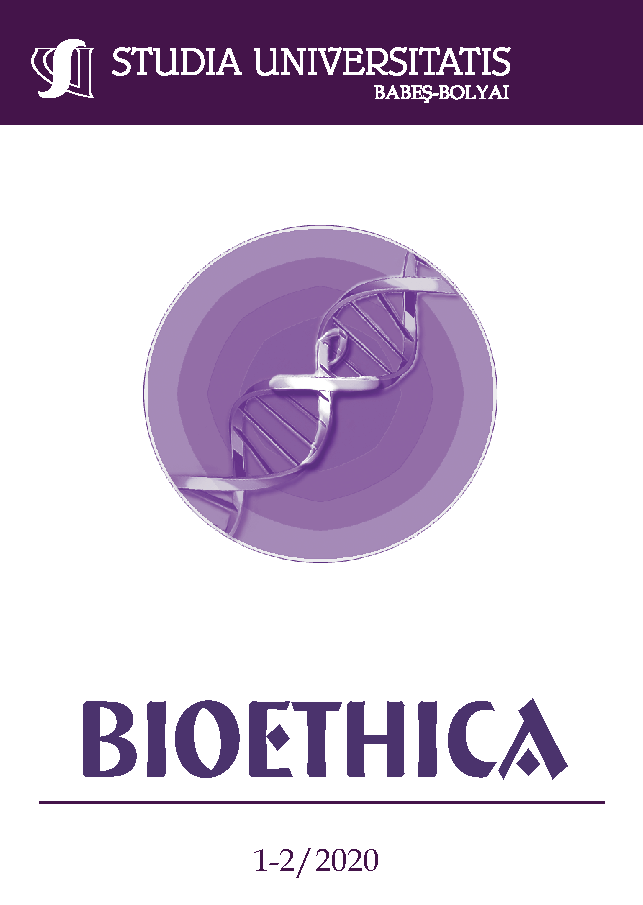
A dialogue between Maria Aluaș and Professor Rouven PORZ, Universitätsspital BernInselhospital Bern, Switzerland and Visiting Professor at the Iuliu Hațieganu University of Medicine and Pharmacy, Cluj-Napoca, Romania
More...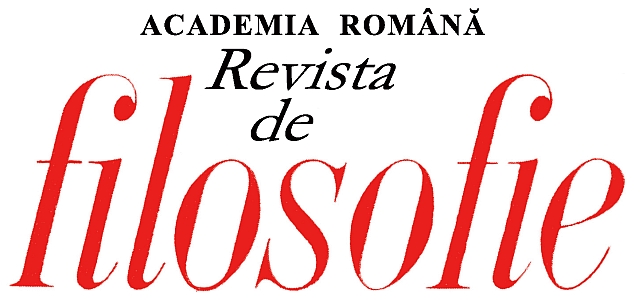
I try to clarify the distinction between virtues and values and I highlight the inflationary use of values as such starting with the XIX century. I elaborate on sets of virtues and virtue based evaluations. I also propose a criterion – the human rights – to differentiate between sets of virtues and I argue that the Christian set of virtues highly satisfies this criterion. I wait that recent evolutions concerning morality and even anthropology satisfy at least at the same level the criterion, the human rights. Until then we as persons and communities have to conserve the traditional virtues and morality.
More...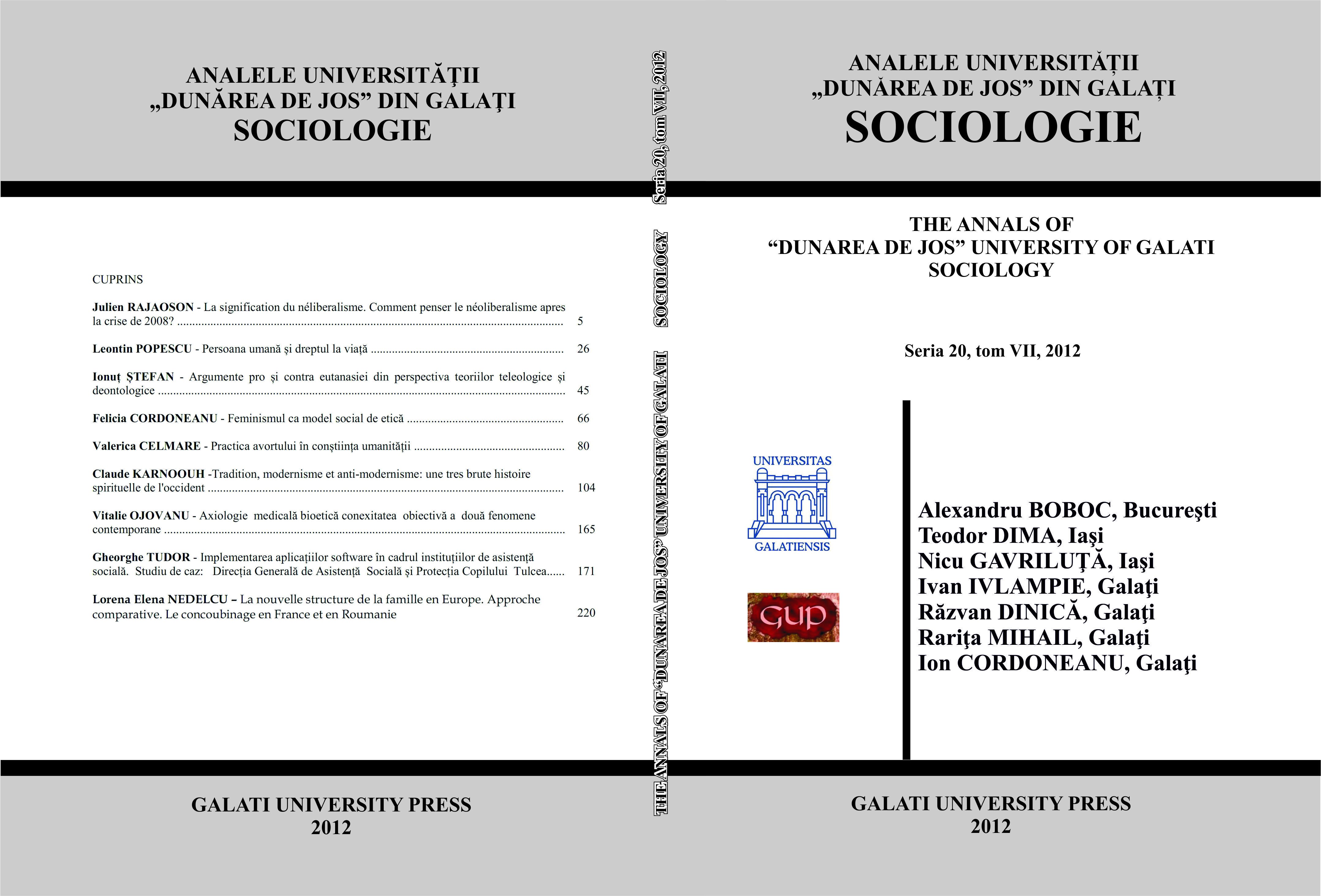
Bioethics represents an important field in the insistent aspiration of modern civilization in the insurance of humanity and biological environment survival. It appears as the result of some acute social and scientific-technical imperatives. From the beginning, bioethics was conceived as an efficient modality in the biological knowledge with an existent value system. The bioethics affirmation facilitated the timely conditions of substantiation of an actual domain - medical, axiology which intersects philosophy and medicine. At the same time, a peculiarity in the medical values study is outlined in the bioethics affirmation which constitutes a permanent and efficient generator of sensibility of the moral problems and spiritual values. The multidimensional manifestation of bioethics catalyzed the insistent and deep study of medical values. Bioethics and axiology become two indispensable steps of medicine.
More...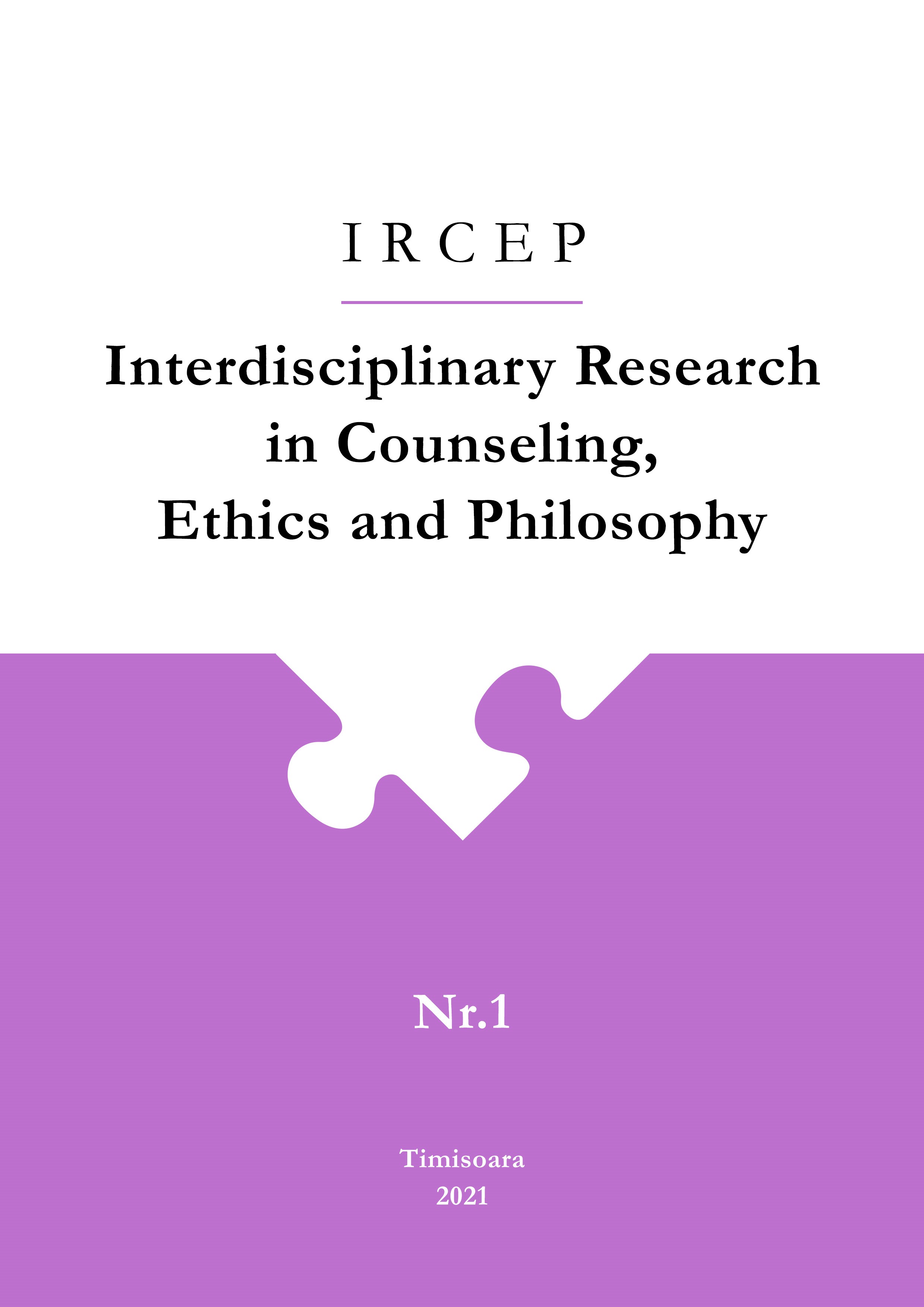
The paper includes an interdisciplinary approach to philosophy, which can develop interdisciplinary links with other fields, which are carried out through current philosophical practices, manifested mainly in the form of philosophical counseling. Some of the areas in which these connections have been identified are presented, namely theeducational field, life sciences and environmental sciences, interferences with the spiritual or theological field, as well as economics and business, materialized through organizational consulting and ethics applied to organizations and institutions. Theconclusion is one of supporting and promoting these practices, which can be further researched and developed on multiple levels, as well as the implementation of a new specialization, in the form of philosophical counseling, as a practice for persons, organizations and communities.
More...
The paper discusses the psychoanalytic interpretative possibilities for understanding Europe's reluctance to accept the UK's decision to leave the union. It develops an interpretation based on Lucan’s concept of 'Name of the Father' to inquire whether the 'European identity' is in fact a neurotic identity, marked by a blocked presence of the primary Lacanian psychoanalytic signifier and the resultant erratic and ineffective policy which can be considered as a group equivalent of the neurotic symptoms that, in psychoanalysis, are treated as primary individual symptoms. This perspective aims to test the limits of the debate over whether psych diagnostics can be applied to political collectives as well as to individuals, and attempts to do so by drawing parallels between the behavior of individual people, on the one hand, and institutions, on the other.
More...
Having been invented in ancient Greece especially as a way of coping with,and even gaining advantage of,personal and collective crises faced by people, philosophical counsellingseen as phronesis –practical wisdom–has been relaunchedfour decades ago under the need of philosophy to retrieve, in modern form, its original social utility. The current pandemic represents a time of multiple distress and unease that philosophy under the diverse facets of its counselling potential, is fully capable of addressing in complementarity with other forms of help.
More...
This paper is a summary of my practical research regarding to the particularities of applying Philosophical Counselling in developing high performing teams in corporate environment. Considering that most of the employees from corporate environment, at least in Romania, are not yet familiar with this new domain, the research is focused to investigate the possibility of obtaining practical results in developing high performing teams and to highlight the value added of practicing Philosophical counselling in corporate environment.
More...
Since cafe philosophy got started in Croatia in 2011, it has been conducted using a method developed by its founder M. Sautet: participants themselves suggest topics to discuss and select them democratically. Conducters are required to have a degree in philosophy, and to keep the discussion on track regarding philosophical rigor and structure. The first aim of the paper is to get an insight into a spiritual climate of the moment through analysis of the selected topics. Given the phenomenology of co-occurrences of the topics, it comes clear that apart from classical philosophical issues such as time, order, truth and meaning, participants predominantly choose to discuss ethical and societal issues. It comes out that they are overall preoccupied with human relationships, actual social trends and problems, as well as their own personal development. The second aim of the paper is to test whether the cafe philosophy is understood among participants as a kind of therapy, or at least a help to live a more balanced and happier life, and whether philosophy can be legitimately understood as a (group) therapy. The authors conclude that philosophical dialogue differs from a therapeutical one by a set of criteria, however it may have therapeutical side effects, as it usually does. Following the thought of E. Martens, philosophizing in public corresponds to an accurate understaning of philsophy as elementary cultural technik(Martens, 2009)
More...